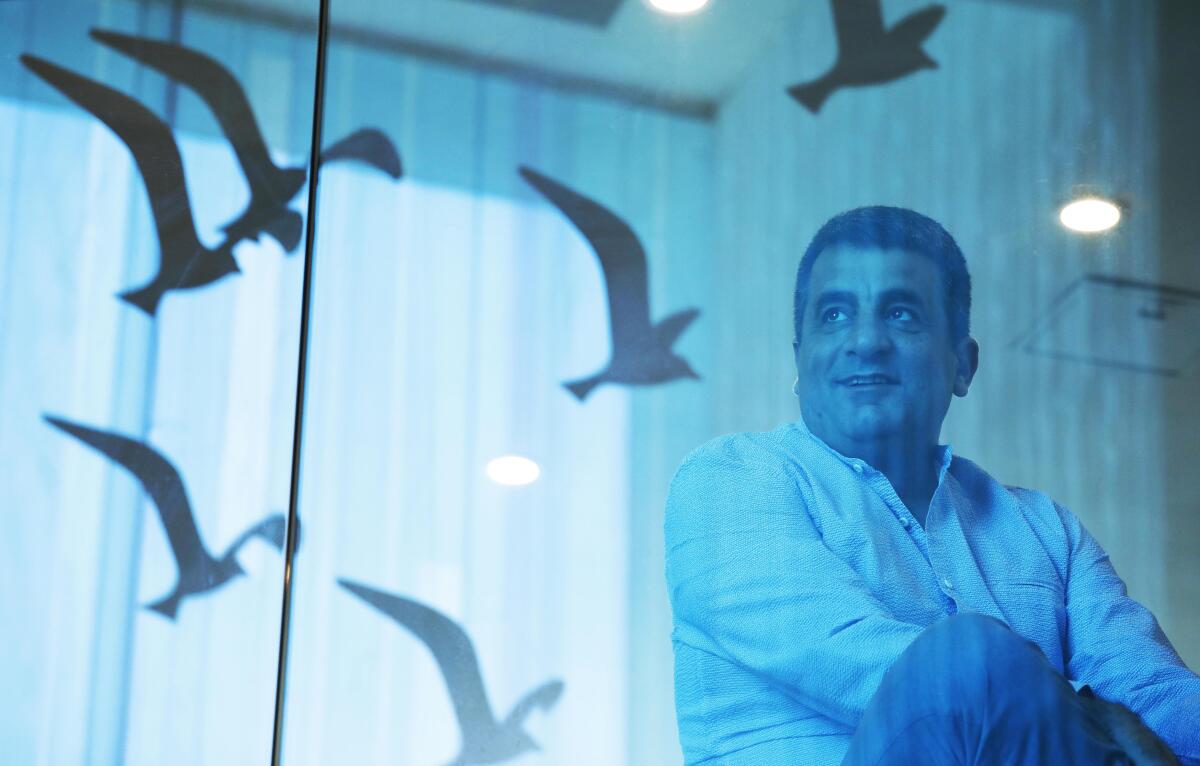Telluride documentary puts you in the room for a decade of Middle East peace talks

- Share via
It all started with an overheard conversation.
In the U.S. to interview Henry Kissinger, gifted Israeli documentarian Dror Moreh (Oscar-nominated for “The Gatekeepers”) was asked to wait a moment while Kissinger conferred with diplomat Dennis Ross, the key State Department player in America’s decades-long search for peace in the Middle East.
“It was right before the Iran nuclear deal in 2015, and I was a fly on the wall as they candidly discussed a lot of different scenarios,” Moreh says on the telephone from his home in Israel. “I felt for the first time like I was in the White House with the president speaking to his advisor.
“You always get the photo op outside, you never hear the stories of what went on inside the rooms. I said to Dennis, ‘You were the main negotiator for so long between Israel and the Arabs, you were there, would you be willing to speak openly about that?’ He had to think about it, but he said yes.”
Having its world premiere at Telluride this weekend, “The Human Factor” is the compelling documentary that resulted. It’s as significant as it is fascinating, and it is drop dead fascinating, offering not only intimate personal stories involving the likes of Yitzhak Rabin, Yasser Arafat and Syrian leader Hafez al-Assad but also potent insights into what went wrong so many times in that most incendiary part of the world.
Again and again we hear eyewitness accounts of extraordinary moments from half a dozen key American mediators, like the complex backstage negotiations leading to the famous Rabin/Arafat Washington, D.C., handshake and Jordan’s King Hussein telling Israel’s Benjamin Netanyahu to his face that he didn’t have the maturity to be a leader.
“What happened, why are we not able to reach peace?” Moreh asks rhetorically. “It’s one of my passions to understand.”
His conclusion, which led to a change in the film’s title from “The Negotiators” to “The Human Factor,” was the gradual realization that a key reason the peace process didn’t succeed “was basically the human factor, personalities and the human connection between people.
“It’s not just smart people doing fact-based calculations. They are human beings just like us, motivated by the same things. The difference between us and them is that their decisions affect millions of lives.”
One of the film’s biggest surprises is the negotiators’ thoughts on the failed 2000 Camp David summit of Bill Clinton, Arafat and Israeli Prime Minister Ehud Barak.
“Even as an Israeli who thought he knew everything, you discover things,” Moreh says. “I was led to believe that Arafat was responsible for the collapse of the talks, but with a deeper understanding of the process he is not the one to blame for the Camp David failure, that is not what was happening.”
Because his concern is so personal, Moreh put an extraordinary amount of work into “The Human Factor,” interviewing Ross for 40 hours and each of the other five negotiators he spoke to for the film, including diplomats Martin Indyk and Aaron David Miller, for no less than 10 hours apiece.
Moreh decided early on he didn’t want the film to include on-camera encounters with decision makers like Madeleine Albright and Condoleezza Rice.
“I wanted just the professionals,” he explains. “I wanted only the point of view of those whose job it was to create peace, to try to bring everyone together.”
The last negotiator to sign on was Gamal Helal, an Egyptian Coptic Christian who was the Arabic interpreter for four presidents and seven secretaries of state. “He was not easy to persuade, but his insights are invaluable,” Moreh says. “He knows the Arab world.”
Because “The Human Factor” is on one level a talking-heads movie that conveys very detailed information, Moreh says it was “the toughest of all my movies to try to create drama. How do you make diplomacy interesting to people? A lot of effort went into that, went into shaping the stories to get the essence. The editor became richer than me for this movie.”
Also a key question was the visual approach to the anecdotes the mediators tell. Moreh says he considered using animation or CGI or even flesh-and-blood actors to illustrate them but then a resource he hadn’t known existed came to light.
“The [U.S.] president has an official photographer with him at all times, and my researchers discovered the unbelievable contact sheets from those shoots, thousands and thousands of pictures, amazing documents of those historical moments. It really is a treasure to have those.”
Starting in 1991, “The Human Factor” basically ends with that failed Camp David summit, which Moreh calls “the last really serious attempt to get close to a peace deal — all that came after was nothing. The situation today is far worse than it was in 1991, we’re so much further away than when Dennis Ross began working with [former U.S. Secretary of State] James Baker.”
As to what stays in his mind after such a deep dive into the past, Moreh echoes interpreter Gamal Helal: “if you are not willing to accept the other side, there is zero hope for peace. There are two sides to every coin, it’s so cliché but so fundamental.” More than that, Moreh wants to emphasize that his film’s thrust is that “if you think these events don’t affect your life, you’d better think twice.
“If peace had been achieved, probably what happened in Syria and the refugee crisis in Europe and everything that followed from that would not have happened.
“You should care about conflicts that happen in faraway places because it affects your life in the end.”
More to Read
Only good movies
Get the Indie Focus newsletter, Mark Olsen's weekly guide to the world of cinema.
You may occasionally receive promotional content from the Los Angeles Times.











